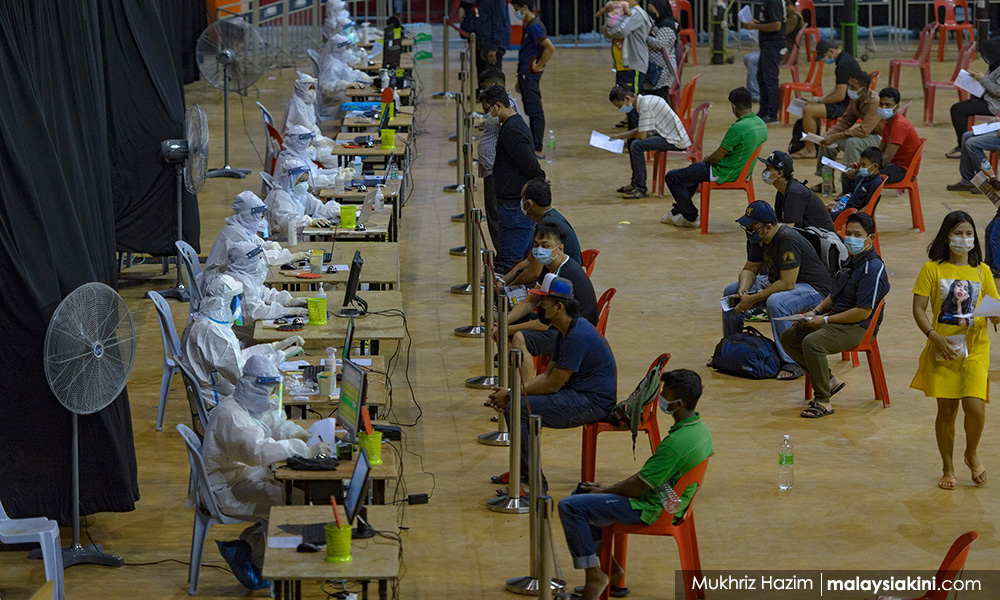As more images and videos of large crowds spilling out onto the streets at several Covid-19 Assessment Centre (CAC) outlets are circulated on social media of late, experts have said there needs to be a re-evaluation of the assessment process to make it safer for everyone.
International Medical University pro vice-chancellor and Academy of Medicine council member Dr Zabidi Hussin said gathering so many positive patients in one place is a “big no-no” as it endangers the medical staff on duty.
In his last visit to the Stadium Melawati CAC in Shah Alam about four weeks ago, Zabidi said he got lost among the Covid-19 patients as there were no clear signages and he saw medical assistants mixing with the Covid-19 patients without wearing N95 masks or face shields.
He was visiting the CAC in his capacity as the head of the healthcare workers welfare group, as appointed by the government.
Several images and videos of large crowds outside the Stadium Melawati CAC and the Bandar Mahkota Cheras CAC, among others, have been circulated widely on social media yesterday.
They depict long lines of people queuing along the streets as they await their turn to enter the CACs.
The CACs were first set up nationwide on Jan 25 this year to handle the assessment of Covid-19 patients undergoing treatment at home.
They are supposed to also help identify suitable patients to monitor at home, who will be monitored and evaluated by CAC staff using the home assessment tool (Hat), as well as to identify high-risk patients and those who will be referred to Covid-19 quarantine and treatment centres.
Instead of this system, Zabidi suggested that perhaps a virtual assessment system can be created where patients are assessed via video calls or something similar.
Those who do not have access to the internet for a video call could have their mobile data subsidised, he added.
“Then we can set up a huge call centre to monitor (the patients)… if you see there are patients who need further evaluation, they can be brought in.
“There needs to be a command centre to monitor these patients virtually,” Zabidi said when contacted by Malaysiakini yesterday.
He pointed to an article from the non-profit academic medical centre Cleveland Clinic’s Journal of Medicine, which described how the centre had implemented a Covid-19 disease monitoring programme. Cleveland Clinic is based in the state of Ohio in the US.
The article noted that patients are enrolled in the home monitoring programme after an ambulatory virtual assessment with a medical officer.
All newly identified patients will receive an outreach call to provide them with instructions on home isolation, educate them on Covid-19, screen for concerns about social support and home safety and invite them to use the specially-built MyChart Care Companion app.
The app is a patient-engagement platform that allows patients who are self-monitoring to enter data on their Covid-19 symptoms.
“Essentially, it is monitoring at home and reporting the symptoms. (They) also use an app, the MyChart Care Companion app.
“Even the MySejahtera app can be formatted for such purposes,” Zabidi said.
The actual process not being complied with
The Islamic Medical Association of Malaysia Response and Relief Team (Imaret) Covid-19 task force coordinator Dr Ahmad Munawwar Helmi Salim said the actual Covid-19 assessment process is not being complied with, which is one of the reasons behind large crowds at CACs.
Imaret had been volunteering to assist the frontliners at the CACs.
Munawwar said the first gatekeepers of the assessment process are the local District Health Offices (PKD), who are supposed to call individuals who tested positive to determine whether they are high-risk patients or otherwise.
Only high-risk patients will be brought to the CAC while low-risk patients are supposed to be assessed at the PKD, he added.

Munawwar said those who can safely be allowed home will be monitored remotely for the duration of their quarantine.
However, the current situation is that the PKDs are overwhelmed and so many individuals who are positive with Covid-19 do not know where to go.
Most of them end up going directly to the CACs, as that is what they believe the process to be, he said.
“Most of these people are not coming by appointment, these are walk-ins. By right, we only accept appointments but we are not going to turn away walk-ins,” Munawwar told Malaysiakini.
Another reason why there are large crowds is that people are not aware that there are many CACs, even within Selangor itself, he said.
“Everyone comes to the Stadium Melawati CAC. There are many CACs everywhere in Selangor, but people don’t know about them, so people come as far as from other districts in Kuala Lumpur."
Munawwar said raising the awareness of the public about the locations of other CACs would help ease the crowd at some of the more well-known CACs like the one at Stadium Melawati.
It would also help to decentralise the assessment process, by allowing private general practitioners (GPs), who have been trained by the Health Ministry, to perform the assessments instead, he suggested. Zabidi also echoed a similar suggestion.
However, Munawwar noted that this might be difficult to implement as it is not easy to maintain separation between Covid-positive patients and non-Covid patients in clinics.
“(But) ideally, we want to decentralise the assessment of these patients,” he said. - Mkini



No comments:
Post a Comment
Note: Only a member of this blog may post a comment.